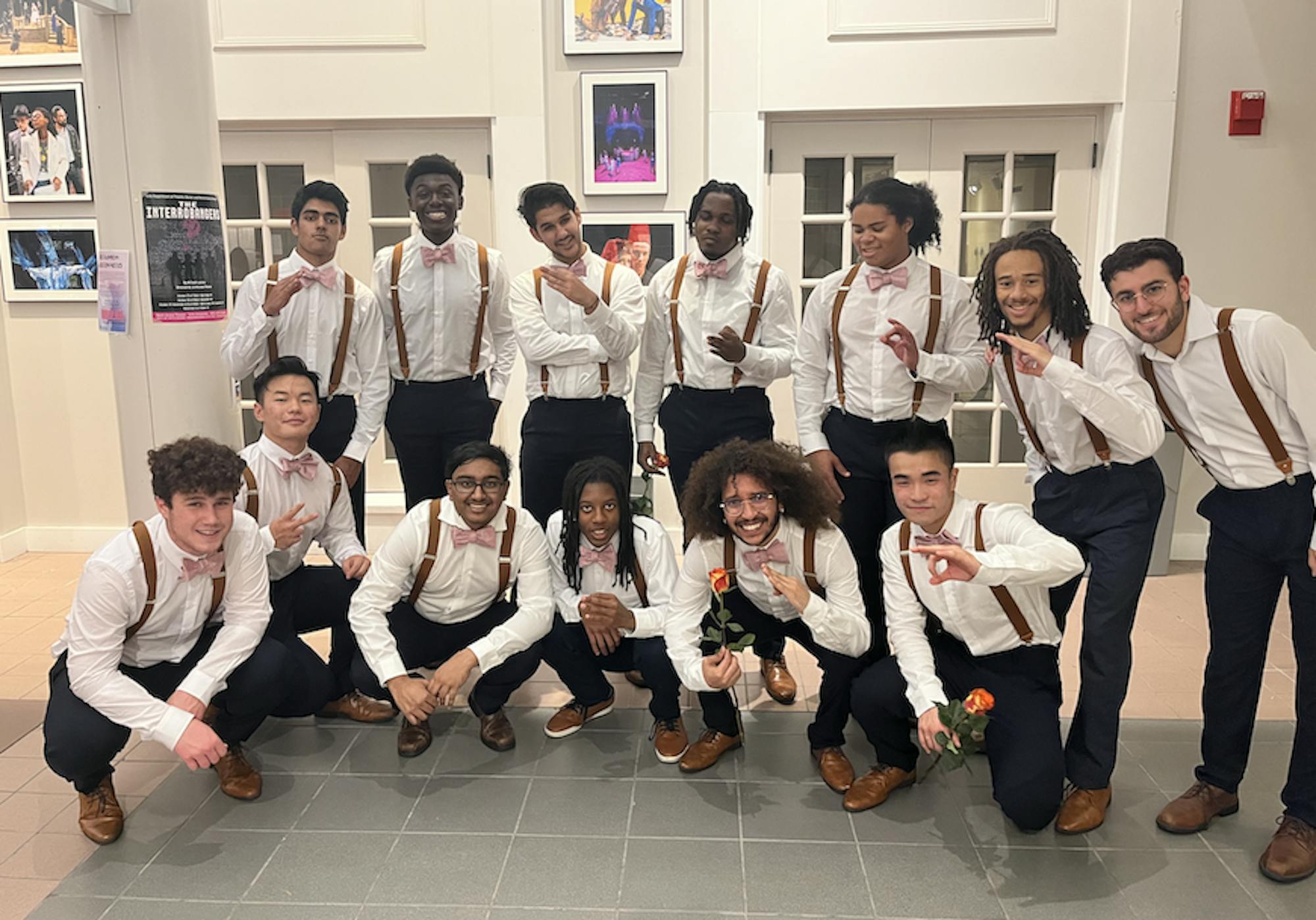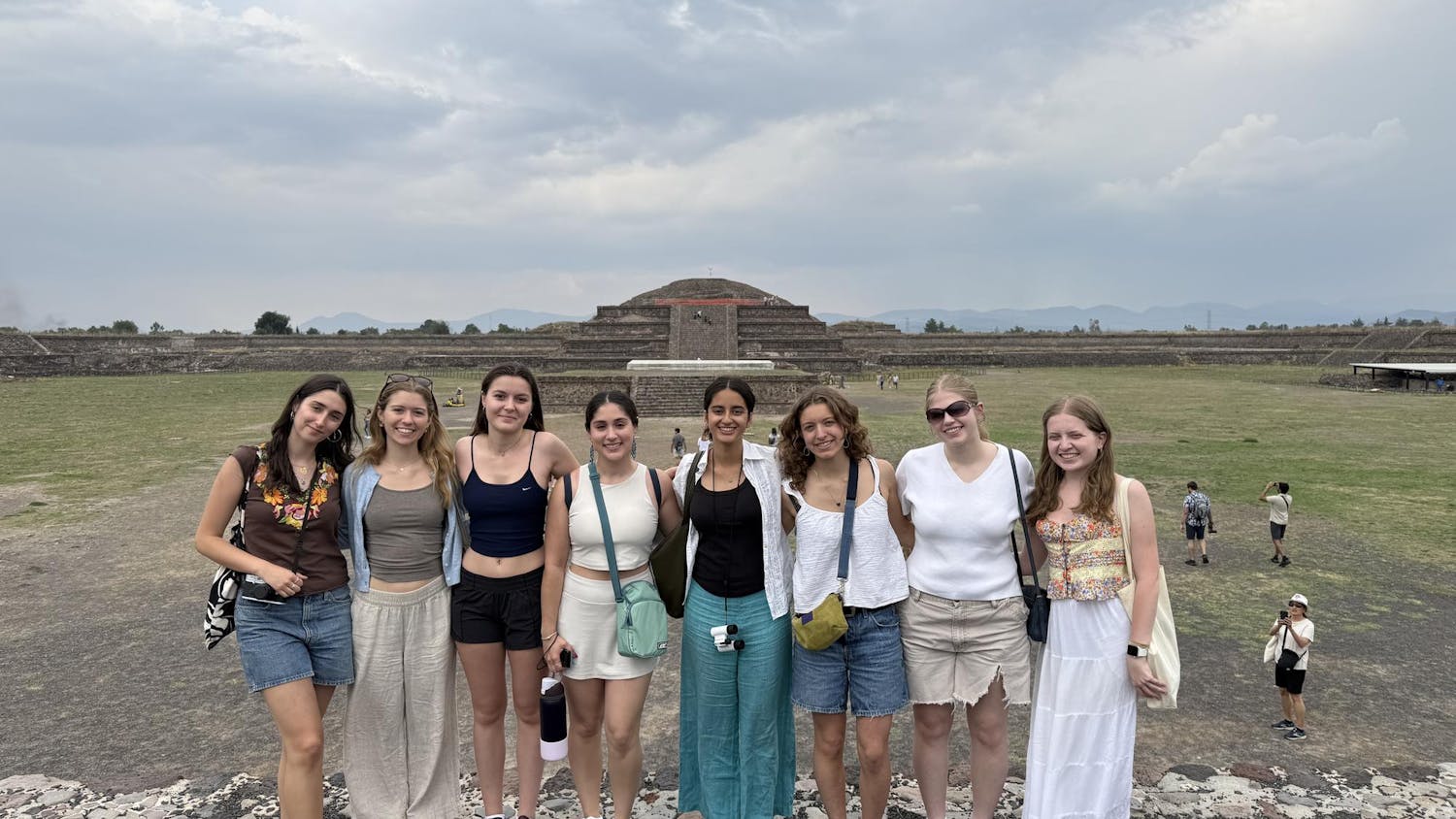This year, BlackOut — Tufts’ signature all-male step team — will be traveling to face off against a host of other universities from across the country in two of the most elite stepping competitions. The first is Upstaged, organized by the National Collegiate Performing Arts in the Lincoln Center of New York City, where BlackOut will be defending the All-American title they won the last time Upstaged occurred in 2020. This highly ranked team will then continue on to compete in the World of Dance finals this August in Anaheim, Calif.
Such high achievement comes along with a strong bond among BlackOut’s members. Three members of the team spoke to the Daily about how their friendships and dedication have fueled their commitment to advancing as step dancers.
Jonathan Assaad, a biology and biomedical sciences double major and one of BlackOut’s senior captains this year, described stepping as a group art form.
“We clap and we stomp in a rhythmic pattern to create both a visual and audible performance,” Assaad said.
Stepping has its origins in African American culture and is inspired heavily by African dance. It continues to be a dance form with a primarily Black presence, as is the case with Tufts’ two step teams, BlackOut and their female counterpart, Envy. Still, BlackOut’s membership and leadership has comprised students of various racial backgrounds.
“Our team is open to everyone, and I think that’s what’s important: is that whoever you are, you have a spot on our team, and you can feel safe,” Assaad said.
However, BlackOut aims to remain a community that stays true to its cultural roots.
“There’s a pattern of traditionally Black art forms being transitioned into non-Black art forms, and that’s just something that we don’t want to see with stepping,” Assaad said. “I think it should be a space where … Black students feel comfortable and want to be a part of.”
Jared Mitchell is a junior studying computer science and a veteran BlackOut member. He elaborated on BlackOut’s step routines to illustrate the multiple components of stepping, which include body percussion, skits and speech.
“Transitioning between our different steps we tend to do skits. So we do use speech in that aspect, to kind of keep the audience engaged,” Mitchell said. “They tend to have more of a comedic flavor, but we see it as an opportunity to be creative in a non-dancing way. It allows us to be interactive with with the crowd.”
For first-year Sameer Mecca, stepping was a newfound passion that he first encountered at Tufts. Like Mitchell and Assaad, Mecca decided to learn more about the group after watching one of their performances on campus.
“I didn’t even know that stepping existed,” Mecca said. “I found out about BlackOut in the O-Show when they performed. … I was like, ‘I want to be a part of that.’”
However, BlackOut faced considerable hurdles due to Tufts health and safety restrictions placed on performance group activity during the pandemic.
“COVID was a really rough patch for us because we couldn’t recruit,” Assaad said. “It was really hard to put ourselves out there. We weren’t performing. We weren’t competing. … [The] captain my freshman year was very discouraged because he felt like it was almost the end of the team.”
Emerging out of the thick of it as COVID-19 restrictions were lifted this academic year, BlackOut put in immense effort into recruitment of new members, doubling from seven to 14. The renewal of an in-person first-year student orientation show was crucial in their outreach and recruitment efforts, and spurred the spiritual revival of BlackOut.
“We worked really hard to make ourselves look good,” Assaad said. “We always hear that we’re … the highlight of O-Show and it’s really nice to hear that.”
Assaad emphasizes that prior experience in dance is not relevant to success in the BlackOut tryouts.
“A lot of people put [up] a barrier where they’re like, … ‘I think BlackOut looks great, but I can't join because I don’t dance,’” Assaad said. “We always try to encourage people to [try out] even if they don’t think they can … [because] it’s about [whether] we think that you’re willing to put in the work and that you have any sort of potential.”
Stepping is no easy feat, as Mecca attests to. It it mentally and physically challenging yet also offers room for creativity.
“Stepping is very hard to learn by just watching,” Mecca said. “It’s a lot of beats with a left and right combination, which looks pretty confusing when you first look at it. … The fun thing, I’d say, is [that] there’s a lot of opportunities for you to improvise and make new steps on your own.”
On stage, synchronicity and energy are key for a great performance by BlackOut. Mitchell describes what tends to go through his mind during one, highlighting that stepping truly is an art that thrives on the presence of an audience.
“I’m thinking about just doing the best that I can in this step: making sure I’m giving good energy into the step, making sure that I’m hitting my moves,” Mitchell said. “Usually by the end of the performances, I’m out of breath because it’s a lot of movement in a short period of time. But I'm always excited to hear the audience’s response.”
To support one another, BlackOut has an internal mentorship system in which veteran members, Step Dads, are paired with rookies, Step Sons. This offers the chance for newer BlackOut steppers to seek out additional, individual help. Assaad relates the overall connection of the team to that of family.
“BlackOut is a brotherhood,” Assaad said. “We are all passionate about stepping but we're also a very close team. We spend a lot of time together, and we don’t just focus on stepping when we’re at practice; we try to foster a safe and close-knit environment.”
Stepping is typically known to be a component of Black Greek life at historically Black colleges and universities. At Tufts, BlackOut is run like any other Tufts Community Union-funded student club on campus.
“The only way for Black students to find out about us in a Black context is through [the Africana Center and Black Student Union]. So I think as long as Tufts is providing the funding and the resources that the Africana Center and BSU need to continue to do what they do, that’s kind of all I could ask for,” Assaad said.
Mitchell mentioned that stepping sometimes flies under the radar in the campus community.
“I feel like the people who know about the step teams, BlackOut and ENVY, they’re very supportive and energetic. But at the same time, I still feel like it’s very low-key,” Mitchell said.
Black History Month in the United States falls during February and, according to Assaad, is a fitting time for BlackOut to celebrate the nature of who they are and what they do.
“I'm definitely very humbled … to be part of our team, especially as captain.” Assaad said. “Throughout the entire year, we try our best to encourage the Black students on our team to step forward and to take leadership positions. I think Black History Month is a time … where it's more dedicated to them sharing their experience and highlighting their position on our team.”
In the past, local schools have invited BlackOut to perform for them during Black History Month. At such events, BlackOut provides the student audience with a history of its team and stepping as an art form.
“I feel honored … that not only I feel am I carrying the tradition of stepping but also BlackOut as its own tradition,” Mitchell said. “I’m able to express it and express myself through it, and I feel like not only is that empowering for me, but it could also be empowering for the next person that decides, ‘Hey, maybe I'll give it a try.’”
In preparation for Upstaged, the World of Dance finals and other potential upcoming competitions, BlackOut is working on getting their group in the best shape possible. This includes going through their self-termed “Hell Week” before important performances, wherein they practice every weekday for two hours on top of the other time commitments members have as students. Stepping out of the shadow of COVID-19, BlackOut is a student club at Tufts that embodies resilience and unity.






